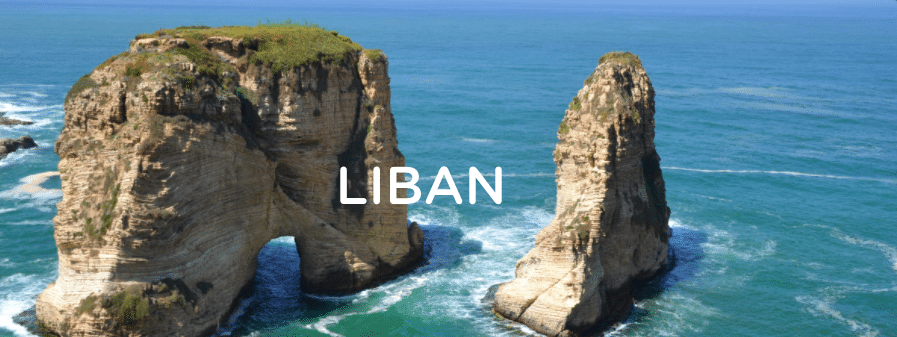|
| |
Après dix séances infructueuses, le Parlement libanais ne se réunira plus avant janvier 2023, laissant ainsi le pays du Cèdre sans président. Selon un rapport rendu par Human Rights Watch, la majorité de la population libanaise ne serait plus en mesure de garantir ses droits économiques et sociaux les plus élémentaires. Enfin, la radio France Info revient cette semaine sur les nombreux actes racistes subis par les travailleurs d’origine africaine et sur l’absence de lois permettant de sanctionner ces exactions.
The election of a new President of the Republic will therefore wait until 2023. After ten unsuccessful sessions, the Lebanese Parliament will not meet again before January 2023, leaving the country of the Cedar, once again, without a president. For its part, the Lebanese people continue to suffer the consequences of the economic and social crisis that has shaken the country for more than 3 years now. According to a report by Human Rights Watch, the majority of the Lebanese population is no longer able to guarantee its most basic economic and social rights. Finally, France Info reports this week on the numerous racist acts suffered by workers of African origin and on the absence of laws to punish these abuses.
|
|
|
|
| |
Info phare - Source médiatique |
|
|
|
| |
Le calvaire des travailleurs africains au Liban
Constituant l’une des principales forces de travail au Liban, de nombreux travailleurs et travailleuses d’origine africaine subissent quotidiennement un racisme décomplexé. Remarques sur la couleur de peau, commerces interdits aux personnes noires, France info rapporte quelques témoignages d’un racisme quotidien vécu par plusieurs milliers de personnes venues au Liban dans l’espoir d’un avenir meilleur. Sans dispositif légal existant permettant de sanctionner la ségrégation raciale ou les atteintes à caractère raciste, les auteurs de ces actes racistes ne sont pas sanctionnés.
|
|
The plight of African workers in Lebanon
Constituting one of the main work forces in Lebanon, many workers of African origin are subjected to outright racism on a daily basis. France Info reports on the daily racism experienced by thousands of people who have come to Lebanon in the hope of a better future, such as remarks on skin colour and shops where black people are not allowed. With no legal mechanism to punish racial segregation or racist attacks, the perpetrators of these racist acts remain unpunished.
|
|
|
|
|
|
| |
Le sujet épineux du retour des réfugiés syriens
Alors que l’État libanais tente de mener à bien sa politique de rapatriement des réfugiés syriens, ce plan se heurte aux réticences de la communauté internationale. L’agence des Nations Unies pour les réfugiés (HCR) a salué les sacrifices consentis par le Liban et a reconnu la nécessité de mettre fin à la crise des réfugiés dans le pays. Toutefois, le HCR s’alarme des obstacles rendant parfois impossible ou dangereux le retour des réfugiés syriens tels la sûreté, la sécurité, les moyens de subsistance et le logement ou les exactions commises par le régime syrien à l’égard des opposants politiques. Les autorités libanaises affirment qu’elles n’ont pas été informées de la moindre atteinte aux droits des réfugiés qui sont rentrés chez eux.
|
|
The difficult issue of Syrian refugee return
While the Lebanese state is trying to carry out its policy of repatriating Syrian refugees, this plan is facing the reluctance of the international community. While the United Nations refugee agency (UNHCR) has welcomed the sacrifices made by Lebanon and has recognised the need to put an end to the refugee crisis in the country, the latter is alarmed by the obstacles that sometimes make the return of Syrian refugees impossible or dangerous, such as safety, security, means of subsistence and housing, or the abuses committed by the Syrian regime against political opponents. For their part, the Lebanese authorities claim that they have not been informed of any infringement of the rights of the refugees who have returned, calling on the international community to facilitate the return of Syrian refugees whom Lebanon can no longer afford to host.
|
|
|
|
|
|
| |
L’élection d’un nouveau président de la République attendra 2023
La dixième séance parlementaire pour l’élection d’un successeur du président Michel Aoun s’est soldée sur un échec. L’année 2022 se termine donc sur un vide présidentiel. Les partis politiques libanais restent incapables de trouver un consensus politique malgré les appels à la négociation et malgré l’urgence de la situation. Du côté du parti de l’ex-président, des critiques ont été émises à l’égard du Premier ministre sortant Nagib Mikati. La tenue d’un conseil des ministres en période de vacance présidentielle est interprétée par certains députés comme une atteinte au Pacte national et à la coopération entre les confessions. Pour les députés issus de la contestation d’octobre 2019, ce blocage n’est qu’un signe supplémentaire de l’épuisement des forces traditionnelles.
|
|
The election of a new President of the Republic will wait until 2023
The tenth parliamentary session to elect a successor to President Michel Aoun ended in failure. The year 2022 thus ends with a dreaded but predictable presidential vacuum. The Lebanese political parties remain unable to find a political consensus despite calls for negotiation and despite the urgency of the national situation. On the side of the party of the former president, criticism was made of the outgoing Prime Minister Nagib Mikati and the holding of a council of ministers during the presidential vacancy, interpreted by some MPs as an attack on the national pact and cooperation between the confessions in a desire to undermine the powers of the Christian Maronite President of the Republic. For the MPs from the October 2019 protest, this blockage is just another sign of the exhaustion of traditional forces and the installation of a culture of obstruction.
|
|
|
|
|
|
| |
Le patriarche Raï renouvelle son appel pour la tenue d’une conférence internationale
Dans le cadre de son homélie dominicale, le patriarche maronite Raï a affirmé que les Libanais souhaitaient l’élection d’un président qui ne les trahirait pas et qui ne prendrait pas le parti de l’une ou l’autre des puissances régionales. Commentant le nouvel échec du Parlement à élire un président de la République, le patriarche maronite a rappelé aux parlementaires que leur rôle n’était pas de créer un vide présidentiel mais bien d’élire un nouveau président, appelant à la fin de cette série de réunions infructueuses qui selon le patriarche ont pour but, entre autres, de démanteler l’État et ses institutions. Enfin, Mgr Raï a réitéré son appel pour la tenue d’une conférence internationale qui permettrait au Liban de concrétiser son retour sur la scène internationale et qui ouvrirait la voie au traitement des questions de neutralité ou encore d’identité du pays.
|
|
Patriarch Rai renews call for international conference
In his Sunday homily, Maronite Patriarch Rai said that the Lebanese wanted the election of a president who would not betray them and who would not take the side of one or other of the regional axes but who, with the help of a new cabinet of ministers, would ensure a return to normal institutions. Commenting on the new failure of the Parliament to elect a President of the Republic, the Maronite Patriarch reminded the parliamentarians that their role was not to create a presidential vacuum but to elect a new President, calling for an end to this series of fruitless meetings which, according to the Patriarch, aim, among other things, to dismantle the State and its institutions. Finally, Archbishop Rai reiterated his call for the holding of an international conference that would allow Lebanon to concretise its return to the international scene and that would pave the way for the treatment of the issues of neutrality and identity of the country.
|
|
|
|
|
|
| |
Le constat cinglant du rapport de Human Rights Watch
Dans un rapport publié la semaine dernière, Human Rights Watch dresse le constat de la situation critique de la population libanaise après plus de 3 ans de crise économique et sociale. Selon l’organisation, la majorité des Libanais ne sont pas en mesure de garantir leurs droits sociaux et économiques, les ménages à faible revenu étant les plus durement touchés. Les causes en sont la baisse de l’activité, l’instabilité politique et la dévaluation. 40 % des ménages gagnent environ 95€ ou moins par mois et 90 % gagnent moins de 360€ par mois. Les personnes à faible revenu vivent aujourd’hui dans une situation d’insécurité alimentaire, sautant des repas ou empruntant pour nourrir leur famille. Moins de 5 % des ménages ont reçu une aide gouvernementale.
|
|
The scathing findings of the Human Rights Watch report
In a report published last week, Human Rights Watch noted the critical situation of the Lebanese population after more than 3 years of economic and social crisis. According to the international organization, the majority of Lebanese are unable to guarantee their social and economic rights, with low-income households being the hardest hit. The causes of this situation are multiple, between a decline in economic activity, chronic political instability and currency devaluation. Some figures support these alarming conclusions: 40% of households earn around €95 or less per month and 90% earn less than €360 per month. Among the basic rights affected by this loss of income, food is not spared. As a result, low-income people are now living in a situation of food insecurity, skipping meals or borrowing to feed their families. Faced with this situation, the Lebanese state is struggling to provide assistance to its population. Less than 5% of households have received government assistance.
|
|
|
|
|
|
| |
This newsletter is written by Pharos Observatory, an observatory of cultural and religious pluralism, as part of its assessment study of religious pluralism in the Near and Middle East. It gathers information, analyses and speeches which may not reflect Pharos Observatory's feeling about the situation, but which should be taken into account as part of the analysis. All recipients, who are Pharos Observatory partners, are encouraged to contribute to this Watch by sharing any information that is worthwhile and fit to print. Ce bulletin de veille est réalisé par l’Observatoire Pharos, observatoire du pluralisme des cultures et des religions, dans le cadre de sa mission d’étude de la situation du pluralisme au Proche et au Moyen-Orient. Il rassemble des informations, analyses et déclarations qui ne reflètent pas systématiquement la perception de la situation par l’Observatoire Pharos, mais qui constituent des documents à intégrer dans l’analyse. Les destinataires, partenaires de l’Observatoire Pharos, sont invités à contribuer à la qualité de cette veille par le partage de toutes informations utiles et diffusables.
|
|
|
|




